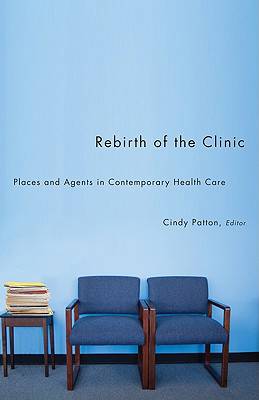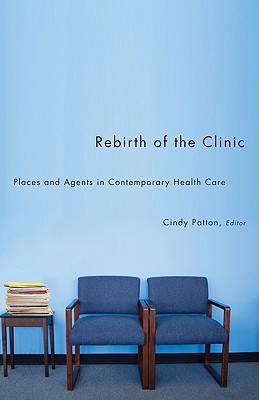
Bedankt voor het vertrouwen het afgelopen jaar! Om jou te bedanken bieden we GRATIS verzending (in België) aan op alles gedurende de hele maand januari.
- Afhalen na 1 uur in een winkel met voorraad
- In januari gratis thuislevering in België
- Ruim aanbod met 7 miljoen producten
Bedankt voor het vertrouwen het afgelopen jaar! Om jou te bedanken bieden we GRATIS verzending (in België) aan op alles gedurende de hele maand januari.
- Afhalen na 1 uur in een winkel met voorraad
- In januari gratis thuislevering in België
- Ruim aanbod met 7 miljoen producten
Zoeken
Rebirth of the Clinic
Places and Agents in Contemporary Health Care
€ 43,45
+ 86 punten
Omschrijving
From physical location to payment processes to expectations of both patients and caregivers, nearly everything surrounding the contemporary medical clinic's central activity has changed since Michel Foucualt's Birth of the Clinic. Indebted to that work, but recognizing the gap between what the modern clinic hoped to be and what it has become, Rebirth of the Clinic explores medical practices that shed light on the fraught relationship between medical systems, practitioners, and patients.
Combining theory, history, and ethnography, the contributors to this volume ground today's clinic in a larger scheme of power relations, identifying the cultural, political, and economic pressures that frame clinical relationships, including the instrumentalist definition of health, actuarial-based medical practices, and patient self-help movements, which simultaneously hem in and create the conditions under which agents creatively change ideas of illness and treatment.
From threatened community health centers in poor African American locales to innovative nursing practices among the marginally housed citizens of Canada's poorest urban neighborhood, this volume addresses not just the who, what, where, and how of place-specific clinical practices, but also sets these local experiences against a theoretical backdrop that links them to the power of modern medicine in shaping fundamental life experiences.
Contributors: Christine Ceci, U of Alberta; Lisa Diedrich, Stony Brook U; Suzanne Fraser, Monash U; John Liesch, Simon Fraser U; Jenna Loyd, CUNY; Annemarie Mol, U of Amsterdam; Mary Ellen Purkis, U of Victoria.
Combining theory, history, and ethnography, the contributors to this volume ground today's clinic in a larger scheme of power relations, identifying the cultural, political, and economic pressures that frame clinical relationships, including the instrumentalist definition of health, actuarial-based medical practices, and patient self-help movements, which simultaneously hem in and create the conditions under which agents creatively change ideas of illness and treatment.
From threatened community health centers in poor African American locales to innovative nursing practices among the marginally housed citizens of Canada's poorest urban neighborhood, this volume addresses not just the who, what, where, and how of place-specific clinical practices, but also sets these local experiences against a theoretical backdrop that links them to the power of modern medicine in shaping fundamental life experiences.
Contributors: Christine Ceci, U of Alberta; Lisa Diedrich, Stony Brook U; Suzanne Fraser, Monash U; John Liesch, Simon Fraser U; Jenna Loyd, CUNY; Annemarie Mol, U of Amsterdam; Mary Ellen Purkis, U of Victoria.
Specificaties
Betrokkenen
- Uitgeverij:
Inhoud
- Aantal bladzijden:
- 216
- Taal:
- Engels
- Reeks:
Eigenschappen
- Productcode (EAN):
- 9780816670192
- Verschijningsdatum:
- 9/11/2010
- Uitvoering:
- Paperback
- Formaat:
- Trade paperback (VS)
- Afmetingen:
- 137 mm x 213 mm
- Gewicht:
- 249 g

Alleen bij Standaard Boekhandel
+ 86 punten op je klantenkaart van Standaard Boekhandel
Beoordelingen
We publiceren alleen reviews die voldoen aan de voorwaarden voor reviews. Bekijk onze voorwaarden voor reviews.








